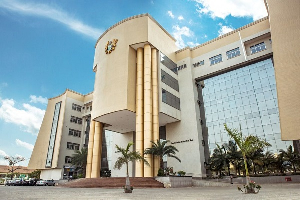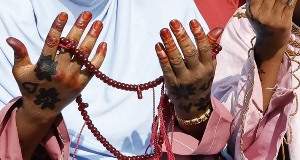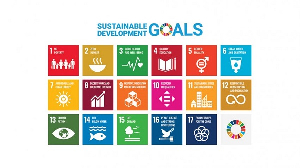Poor Leadership Equals Inferiority Complex, Economic and Cultural Collapse!
By Kwame Okoampa-Ahoofe, Jr., Ph.D.
About a decade ago, Ghana used to be celebrated for the creative imagination of our casket/coffin makers; and so it was with quite a bit of sadness that I read an article titled “MP Weeps Over Chinese Coffins” (Daily Guide/Modernghana.com 9/24/10). Back then, as I vividly recall, caskets made in the shapes and looks of Mercedes Benzes, fish and other forms of natural and human-made phenomena were routinely displayed on America’s network television news and heartily and humorously celebrated for creatively ameliorating the acute pain that bereavement brought humankind.
And so it came as quite a great shock and utter disappointment to read that Chinese-made caskets have flooded our markets. And it is also significant to observe that the Chinese largely cremate their dead. Still, it must be promptly noted, of course, that absolutely nothing happens in a vacuum. Anyway, two critical factors could be responsible for the eruption of such anomaly: one, there ought to be presently raging a sudden and acute depression in the Ghanaian casket-making industry for the Chinese to have been so boldly and shamelessly able to enter the market so conspicuously and appear to be making serious socioeconomic inroads. If such observation has remarkable validity, then it partly appears that either there is a palpable shortage of Ghanaian casket-makers, largely due to the increasing unattractiveness of the industry to our youth, or the kind of morbid inferiority complex primarily engendered by poor and woefully alienated leadership at both the local and national levels that deems things foreign, non-Ghanaian and non-African made to be of greater efficiency, appeal and durability, and thus more cost-effective than those produced in the country.
It also very likely could be that Ghanaian casket-makers significantly lag in access to the sort of cutting-edge technology that is needed to mass-produce enough caskets to readily meet local demand. We must also bear in mind the fact that China has been at the forefront of the made-for-export industry for generations, if not centuries. And with the recent significant economic inroads being made by Beijing in our proverbial “primeval continent,” the casket-making industry may well have been found to be one that is capable of absorbing foreign production – and here also, we ought to bear in mind the fact that Africans are among people with the highest rate of mortality and thus a greater need of caskets than most others. And here must also be recalled the fact that the Chinese are great observers of consumer trends on the international market, as well as avid market economists, their much-maligned and purportedly obsolescent Communist political system notwithstanding. The Chinese are also good at sizing up and deftly manipulating a bribe-oriented political culture such as widely prevails in the so-called Third World in general but Africa in particular.
The other quite obvious aspect of the equation is the fact of modern Cathay being a behemoth global center of production, in no small part due to that mega-country’s billion-plus population of avid and compulsive industrial human cogs. Ghana, on the other hand, like most African countries, is not remarkably renowned or distinguished for the industry or individual diligence of our citizens in a highly technological twenty-first century global economy. It appears that we alarmingly prefer to dominate the consumerist front of the market, however woefully meager our individual purchasing power may be. And the latter state of affairs is primarily to blame for the current crisis being experienced in our casket-making industry, which was recently and bitterly lamented by Mr. Richard Akuoko Adiyia, the Ahafo-Ano-North member of the Ghanaian parliament.
What is both significant and interesting to observe about the apparent serious Chinese inroad into Ghana’s casket-making industry is that even a global industrial giant like the United States of America has for decades been bitterly railing against an inordinately export-oriented Chinese market that is deftly and adamantly protective of its own local industries, even as it studiously, assiduously and systematically causes the complete collapse of its global counterparts. And it is largely and precisely for the preceding reasons why the Accra government needs to put in place at least some basic protective measures to guarantee the long-term survival of both Ghana’s local industries and our nation at large. For it goes without saying that a nation that waits upon another to produce cheap caskets for the burial of its citizens and inhabitants is not worthy of both its name and the respect of its neighbors and counterparts.
The foregoing state of affairs ought to come as absolutely no surprise, at all, to any well-meaning Ghanaian citizen, however shameful and utterly embarrassing it may be deemed, in view of the Atta-Mills government’s recent unimaginative decision to cede the entire public housing industry to a South Korean contractor called STX. Barely a half-century after pontifically declaring its sovereignty from British colonialism, ironically, Ghanaian leaders appear to be fast and far poised towards surrendering our much-fought and vaunted sovereignty to the Asian economic giants.
*Kwame Okoampa-Ahoofe, Jr., Ph.D., is Associate Professor of English, Journalism and Creative Writing at Nassau Community College of the State University of New York, Garden City. He is a Governing Board Member of the Accra-based Danquah Institute (DI) and the author of 21 books, including “Ghanaian Politics Today” (Atumpan Publications/Lulu.com, 2008). E-mail: okoampaahoofe@optimum.net.
###
Opinions of Tuesday, 12 October 2010
Columnist: Okoampa-Ahoofe, Kwame














